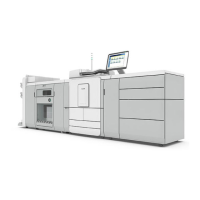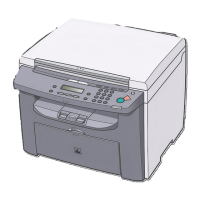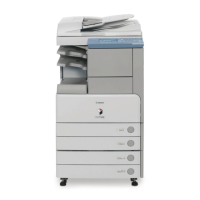Do you have a question about the Canon varioPrint 140 and is the answer not in the manual?
Provides important notes, definitions, and symbols used in the manual for user guidance.
Explains the default customer user groups, their access rights, and roles within the print system.
Outlines the structure of the operation guide and lists other available product information.
Illustrates and describes the components of the varioPRINT DP line and its available accessories.
Describes the printer-only version of the varioPRINT DP line without copy/scan capabilities.
Explains the functional naming conventions used for accessories in UI and software for better readability.
Details the internal and external paper modules, including tray capacities, paper size, and weight.
Describes the stacker/stapler configurations, booklet making, stapling, and optional punch unit features.
Explains the function of the copy tray in collecting printed output and its capacity.
Introduces the removable hard disk for data security and describes its location and usage.
Highlights the multitasking capabilities and functions of the varioPRINT DP line print system.
Describes the main components of the control panel and their functions for system management.
Details the web-based Settings Editor for managing system configuration and displaying information.
Explains the web-based Remote Manager for workload planning and monitoring of PRISMAsync print systems.
Describes the media catalog as the backbone of the media-based workflow for print job media selection.
Outlines the four phases of the document printing workflow: job preparation, workload planning, job planning, and print production.
Explains the transaction printing mode for business-critical data and its differences from document printing.
Describes the printer's power buttons and the different power modes available for energy saving.
Provides a procedure for turning on the printer system by operating the On/Off buttons.
Details the procedure for shutting down the printer and controller in a controlled manner.
Explains how to restart the system via the Settings Editor or the control panel.
Explains how to adjust display language, warning time, job name truncation, and panel readability.
Provides recommendations on using default workflow profiles and explains their settings for optimizing workflow.
Details how to set up and manage automated workflows, including defining attributes for queues.
Discusses various methods for defining print job settings, including printer drivers and automated workflows.
Explains how to use the Remote Printer Driver to prepare complete print jobs from applications.
Introduces PRISMAprepare for preparing print jobs at the page level with preview capabilities.
Describes how to print documents directly from a USB drive and manage this function.
Explains how to add page numbers to PDF print jobs, specifying position, prefix, and suffix.
Introduces copy functions and factory default templates for copy and scan jobs.
Defines the scan function and lists available scan types and output locations.
Provides guidance on placing originals for scanning, including orientation on glass plate and in the ADF.
Details the procedure for copying or scanning bound, heavy, or transparent originals using the glass plate.
Explains how to use the automatic document feeder (ADF) to copy or scan sets of originals.
Describes accessing other system functions while defining copy or scan job settings in full-screen mode.
Introduces PRISMAsync Remote Manager for monitoring and operating printers remotely.
Explains how to use the Remote Control app on smartphones to monitor print production and receive alerts.
Explains how to schedule waiting jobs for printing and manage jobs in the queue.
Describes how to give a print job immediate priority over other jobs using the [Print now] button.
Details how to use the [To top] function to move a job to the second position in the schedule list.
Guides on how to move a scheduled job back to the [Waiting jobs] list for later printing.
Explains how to send jobs, with their settings, to other PRISMAsync printers.
Describes how to combine two or more jobs into a single new job for specific order printing.
Guides on adding banner, trailer, or separator sheets to print and copy jobs.
Introduces the DocBox function for storing, grouping, editing, and reprinting documents.
Provides instructions for system administrators to create new DocBoxes for organizing jobs.
Details how to view and edit job settings within a DocBox, including previewing job properties.
Explains how to modify print job configurations via the control panel for various settings.
Details how to modify the 1-sided or 2-sided printing setting for jobs in various queues.
Guides on how to view and change the binding position, affecting margin shift and staple placement.
Describes how to select different media for a job from the media catalog via the operator panel.
Explains how to enable/disable covers, select media, and set print sides for front and back covers.
Introduces the [Align] function for rough image shifting to create space for staples or punch holes.
Explains the use of [Shift] functions ([Margin shift], [Image shift]) for precise image positioning.
Details how to adjust print delivery settings like output location, sort method, and offset stacking.
Guides on changing the offset stacking method per job based on workflow profile settings.
Explains how to optimize print quality by adjusting settings like brightness, contrast, and resolution.
Guides on changing finishing methods such as staple count, punch holes, and their locations.
Explains how to define finishing methods like staples, punch holes, folding, and trimming.
Details how to change the number of sets for a job in various job lists or DocBoxes.
Guides on how to check the first set of a print job before printing all sets for quality assurance.
Explains how to specify the page range for printing, including first and last pages.
Describes enabling or disabling separator sheets for jobs to distinguish sets.
Explains how to change job settings on a page-by-page basis using the [Page programming] function.
Guides on reprinting jobs from the [Printed jobs] list and selecting multiple jobs for printing.
Describes the options available for selecting multiple jobs for simultaneous printing.
Explains how to print a job ticket for an overview of main job characteristics before printing.
Guides on how to make a proof copy of a job to check quality and layout expectations.
Details manual and automatic methods for stopping the printer, including stopping after a set or job.
Explains how to delete print jobs from various locations like [Scheduled jobs], [Waiting jobs], or [DocBox].
Introduces variable data printing (VDP) and its support for PPML and PDF/VT formats.
Guides on instructing the print system to handle documents with variable data structure as VDP jobs.
Introduces transaction printing, its requirements, and settings in the [Transaction] section.
Provides steps to activate transaction printing mode and set the printer online.
Guides on how to put the printer offline and deactivate the transaction printing mode.
Explains how to shift images horizontally and vertically to correct misalignments in transaction printing.
Details how to create, edit, and load transaction setups for specific transaction jobs.
Explains how to activate a new or edited transaction setup in the Settings Editor.
Guides on exchanging transaction setups between printers with identical types and software versions.
Provides media information for IPDS, including the media catalog and tray-to-media assignment.
Describes printer output recovery behavior in case of errors, detailing normal and suppressed recovery modes.
Covers media messages (PCL) and how the printer responds to missing media requirements.
Explains responding to media missing messages by assigning media from the catalog or using defaults.
Guides on responding to media missing messages by assigning media and loading it into the correct tray.
Explains how to define copy job settings for originals, output appearance, and general job settings.
Guides on making copies by defining only essential settings before touching the Start button.
Details creating custom templates for identical copy or scan jobs, storing default settings.
Explains how to copy originals with different sizes by manually entering correct measures.
Describes using the [Zoom] function to reduce or enlarge images for copy and scan jobs.
Provides instructions for applying staple, punch, fold, or trim finishing methods to the output.
Explains how to rename a copy job using a chosen name for easier identification in job lists.
Guides on copying or scanning multiple sets of originals into one document with subsets.
Details using tab sheets as inserts to create physical divisions within a copy job document.
Explains how to scan a document now and print it later (postponed copying) to waiting jobs or DocBox.
Details configuration for Scan to File, SMB, Email, LDAP Server, and Address List File (ral.csv).
Explains how to define scan job settings for originals and output files, including resolution and color.
Covers specific scan types like Scan to File, Scan to Email, Scan to USB, Scan to DocBox, Scan to SMB, and PDF scan jobs.
Guides on creating custom templates for recurring scan jobs, including combining subsets into one file.
Provides solutions for common scan quality problems like upside-down pages or incorrect page size.
Explains the [Schedule] view for daily planning of print jobs, including job and media status.
Guides on loading and assigning required media directly into paper trays using the [Schedule] view.
Details how to open trays and load/assign media using the [Trays] view softkey for media management.
Describes the dashboard's function in displaying system status, supplies, current process, and operator instructions.
Explains the status colors of the operator attention light and their meaning regarding printer status.
Introduces Remote Monitor for accessing up-to-date printer status information remotely.
Provides an overview of media handling, including reload behavior and media assignment.
Covers Trays View, paper tray information, icons, media catalog, and temporary media.
Covers loading media via paper tray button, Trays softkey, and adding media to the catalog.
Covers media indicators, separation enhancer, tray size, JIS B5 adapter, and special media processing.
Details media registration procedures, including automatic, manual, and specific media adjustments.
Covers system configuration for production, security, and maintenance tasks for operators.
Details maintenance procedures for machine parts and image quality improvement by operators.
Explains accessing and changing system settings via the control panel for operators and administrators.
Guides on creating, exporting, and restoring system configurations, including user configurations.
Describes billing and day counters, their information, and how to print billing counter reports.
Details upgrading PRISMAsync and Windows software, and managing software licenses.
Introduces POC for self-replacement of parts and provides guidance on maintenance tasks.
Explains paper path registration, separation roller, heat exchanger foil, and spiral cleaner replacement.
Provides instructions for clearing paper jams in the lower input paper path and registration unit.
Details Remote Service functionality for diagnostics, meter reading, and software upgrades.
Covers checking toner levels, adding toner, and checking staple cartridge status and replacement.
Provides an overview of possible machine and job errors and their corresponding solutions.
Explains how to store logging for software errors for analysis by the service team.
Provides general specifications including description, toner, imaging technology, warm-up time, and dimensions.
Details environmental requirements like ozone emissions, temperature, humidity, and ventilation.
Lists maximum engine speeds in images per minute for various models, media, and print settings.
Describes internal and external paper modules, including tray capacities, paper size, and features.
Details specifications for finishing options like copy tray, staple finisher, and booklet finisher.
Outlines supported media types and their corresponding weights for paper modules.
Provides detailed specifications for printing, copying, and scanning functions, including resolution and features.
Lists specifications for the PRISMAsync controller, including processor, memory, and network connectivity.
Details supported printer drivers for various operating systems and printer languages.
| Duplex Printing | Yes |
|---|---|
| Print Speed (Black) | 140 ppm (A4) |
| Supported Media Sizes | A3, A4, A5 |
| Maximum Paper Size | A3 |
| Connectivity | Ethernet |
| Supported Operating Systems | Windows |











